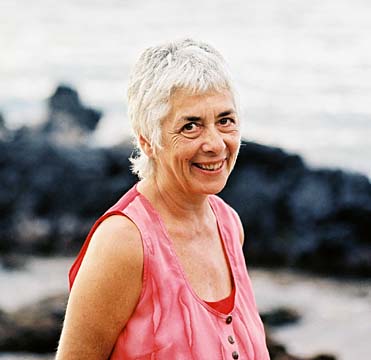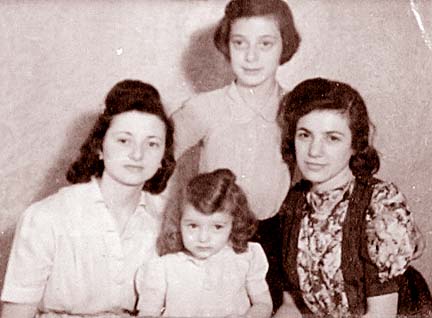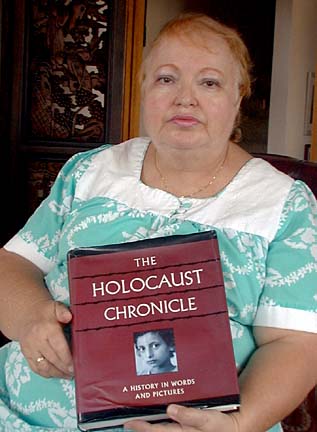
Honoring the spirit of survival
Hilo resident Tana Basa was only 2 when Nazis forced her Jewish family into Theresienstadt concentration camp in Czechoslovakia.
Maui theatrical performer Risa Whiting survived the Nazi extermination of Jews by living under an assumed name as the daughter of a Belgian railroad worker.
Oahu songwriter-composer Stan Rubens remembers being among the fortunate to escape from confinement in a theater in Holland where hundreds of Jews were kept by the Nazis before being sent to the death camp in Auschwitz, Poland.
Among at least eight Hawaii residents who are Holocaust survivors, the three are being honored during a Sunday luncheon in Honolulu by B'nai Brith and the University of Hawaii-Manoa's Hillel Jewish student organization.
B'nai Brith board member Johanna Afshani said the event honoring survivors serves as a reminder of the atrocities suffered by Jews more than 60 years ago.
Some Jewish orphans were able to escape the Auschwitz death camp in Poland thanks to an anti-Nazi underground. Among the children in this 1942 photo are Marvin Schwartz, far left, then called Mozes Englander, and his sister Fanny, 2, later known as Risa Whiting.
Whiting is now a Maui resident.
"This event will honor the spirit of survival and defiance of the survivors," Afshani said. "Given all of the horrors that they endured, it is amazing to hear how wonderfully upbeat they all are."Survivors say speaking about the Holocaust that killed between 5.1 million and 6 million Jews is never easy and that it seems trite to put it into a few words -- and then, for some, the crying begins.
Rubens, who teaches songwriting to an adult education class at McKinley Community School for Adults in Honolulu, said he found himself fighting to control his emotions while recollecting events and writing a book about the Holocaust.
"All of a sudden, I'm looking at my hands and pants and asking, Why are my hands sweating and why are my pants sweating?" Rubens said. "I didn't realize tears were running down my eyes. I was crying."
He said he believes the crying came from pent-up emotions and his realization about the loss of many family members, including his grandmother, an aunt and a niece.
Then there was the constant terror from age 8 to 13 and fear that an arrest by the Nazis could take place at any moment, he said.
There were those in his own neighborhood who turned against his family.
One day in 1940, a Nazi sympathizer told authorities that Ruben's father was a Jew, and managed with the help of the Nazis to confiscate his retail store in Amsterdam.
Rubens recalled 500 to 600 Jews being herded into a Jewish theater while awaiting transport to a Dutch concentration camp at Westerbork, then the death camp at Auschwitz.
His mother and father escaped by slipping out of a transport truck after bribing a guard, and his sister fled through a side door in the children's holding area away from the theater.
He was caught trying to run away and returned to confinement. Luckily, he was placed in a holding area and seized the opportunity to flee like his sister, Rubens recalled.
Holocaust survivor Tana Basa is shown above as a 2-year-girl with her sisters in the Hecht family. They were, from left, Eva, Erika and Ruth.
With the help of underground supporters fighting the Nazis, his family moved from one safe house to the next, then he and his sister were sent to stay at a farm under assumed names until the end of the war.The fear of being discovered never left them until the war's end in 1945, because the Nazis continued to conduct house-to-house searches.
"Many times, there were raids," he said. "Trying to stay out of their hands wasn't easy."
Basa said she and her father, mother and three sisters were put in Theresienstadt at Terezin in Czechoslovakia, where the Nazis confined political prisoners and Jewish intellectuals such as lawyers, artists and physicians.
Terezin was used by the Nazis as a model camp for examination by the Red Cross whenever there were outcries about atrocities, she said.
Basa said her father, Paul Hecht, the head cantor of Berlin, was spared from being put in an extermination camp and placed in Terezin because he was a World War I hero who lost a leg fighting for Germany.
Her mother, Karoline, who had high blood pressure and anxiety from being in the camp, died of a cerebral aneurysm.
"She got really sick, but there was no medicine and she just died," Basa said.
Two of her older sisters, Ruth and Erika, were placed in different barracks at Terezin and reunited with her family after the war, but the third sister, Eva, who survived three years in Auschwitz, died of a sickness three months after the war's end, she said.
All eight of her father's brothers and sisters perished during the Holocaust, and five of her mother's seven brothers and sisters also died, she said.
Basa said she emigrated with her father from Berlin to the United States in 1951 and has lived on the Big Island for about 30 years with her husband, Juanito, who is retired from the Hawaii County Police Department.
Basa said she only learned about the events leading to her sister Eva's death in the early 1990s, when war records were opened to the public after the fall of the Berlin wall.
"She was buried in the Jewish cemetery in Sweden," she said. "This June, we're going to go to Stockholm and hope to visit her grave."
In Hilo yesterday, Tana Basa, held a book that describes the Holocaust genocide of Jews during World War II, including descriptions of the concentration camp at Theresienstadt in the present Czech Republic, where Basa and her family were held when she was a girl.
Whiting, a Maui resident, is the daughter of Antwerp diamond cutter Abraham Joseph Englander and his wife, Chawa.Whiting said she was 2 1/2 years old when she was separated from them. She was put into hiding with the Belgian family of Maurice and Denise Vander Voordt.
"He was a railroad car conductor and a member of the underground," she said.
The Vander Voordts stashed a cache of arms for the underground in the basement of their home, and Whiting said she realized later why she was told to never go down into the basement.
Whiting remembers her discovery after World War II at age 8 that she was not the Vander Voordts' daughter and that she was going to be adopted by a Jewish theatrical family from New York.
Maurice and Anna Schwartz operated a New York City-based Yiddish theatrical company and had decided to adopt her and her brother, Marvin, who lived in an orphanage in Belgium.
Whiting said the Nazis killed her father and mother, and she has been unable to locate any surviving relatives.
Whiting said she considers herself blessed to have survived the Holocaust and to have been a part of three families, including the Schwartzes' Yiddish Arts Theatre group in New York, where she performed as an actress.
Offstage, she had to cope with emotional scars left by the war.
Whiting said during her 30s she had deep depression and feelings of abandonment.
"I didn't understand how the experience of the war had made me look at the negative side of everything," she said.
She said was able to learn to cope with the emotional upheavals in her life through psychotherapy and a reunion with the Vander Voordts. She learned that the Vander Voordts wanted to keep her but were told they could not.
"Hearing that was really important to me and helped to change my self-image," she said. "They really cherished me a lot."
Whiting said she had to relearn how to think and how to choose the kind of life she wanted to have with her family.
"It didn't come by accident. It was an education," she said.
Rubens said his childhood experience helped to give him the confidence to become a world traveler, first migrating to Australia with little money and few possessions, then to the United States.
He taught himself how to play the keyboard and compose songs and has sailed a boat from California to Hawaii.
"I'm a person who believes if I can survive the Nazis, there is nothing that can stop me."




